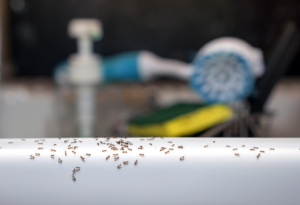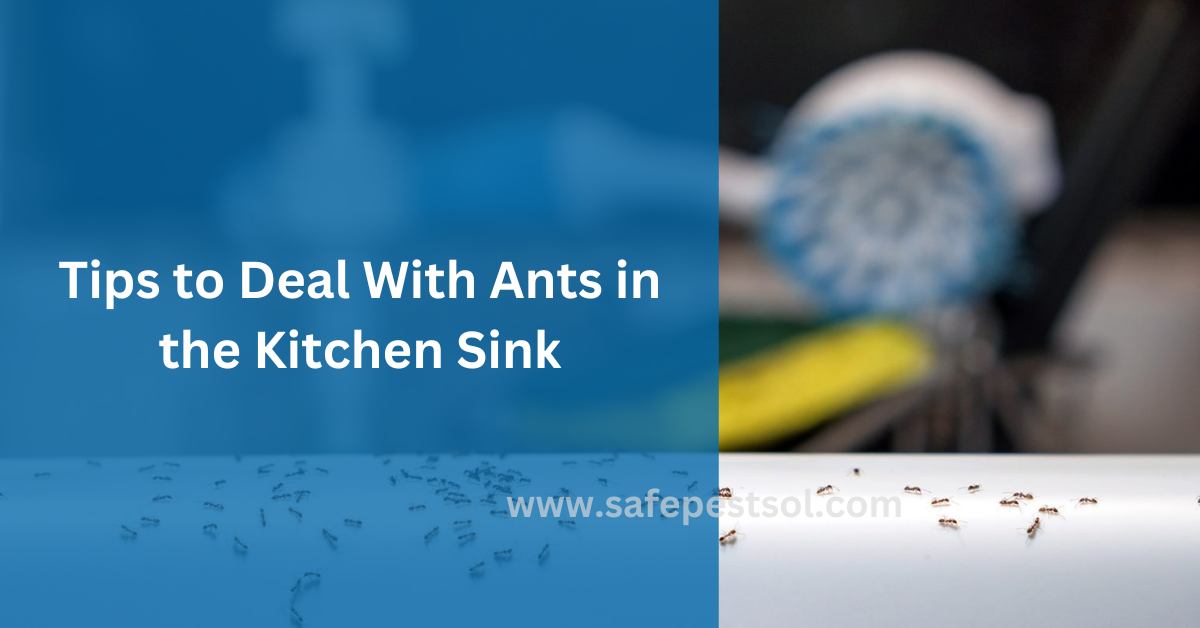Steps to Deal With Very Tiny Ants Around the Kitchen Sink
In your kitchen sink, tiny ants are very annoying nuisances. The little creatures invade your home for food and water, and left unattended, these ants can become a full-blown ant infestation. Although they appear harmless, they can contaminate food and be an annoyance in your kitchen.

However, the good thing is that these pests can be easily dealt with using a combination of preventive techniques and natural remedies. This article will look at why small ants are invading your kitchen and provide effective tips to get rid of them.
Why Are There Ants in Your Kitchen?
Since ants always look for food scraps and water sources, this is the major reason why ants gets into the kitchen. Even the smallest amounts of food left behind will attract them. Unsealed foods, spilled sugar, and dripping faucets could turn your sink into an ant haven.
Other entryways for ants could be cracks in the walls, gaps along windows, or small openings found next to pipes. Once inside, the ants leave marked trails for other members of the colony to follow. This pattern can easily lead to a future infestation if not handled in time.
Types of Ants Common in the Kitchen
People refer to every ant that invades their kitchen as a sugar ant. However, this is quite misleading. The actual sugar ants belong in Australia. On the other hand, different ants species can be found in kitchen, which include:
- Odorous house ants – They produce a disgusting odor when crushed.
- Pharaoh ants – Occasionally traceable close to kitchen cabinets and the drains.
- Little black ants – Form gigantic colonies and invade food storage areas.
- Pavement ants – They frequently enter through floor cracks.
- Argentine ants – They create huge colonies that are extremely difficult to eradicate.
Each of these ants can adapt and nest in wall cavities, kitchen sink drains, and sometimes under household appliances.
Tips to Deal With Ants in the Kitchen Sink
1. Use a Sink Strainer
Installing a sink strainer is a simple yet effective way of keeping ants from entering the kitchen waste via the drain. Such strainers trap food particles before they get to the kitchen sink drain to repel ants from food debris. If you have a strainer, keep it clean to remove trapped particles since even the tiniest crumbs can lure ants.
In case you don’t have one already installed in your sink, getting one will eliminate ants and prevent an unhealthy build-up of food in your plumbing. A few local building codes even encourage food-grade strainers to maintain a hygienic kitchen.
2. Clean Leftovers Immediately
Ants are just too good at locating food, even the tiniest bit! Little crumbs left from meals, grease stains, and spills can be an ideal food resource for ants. To prevent ants, you can do the following things:
- Wipe the kitchen cabinets, counters, and tables after meals.
- Sweep the floors regularly to eliminate hidden particle foods.
- Take the trash out daily to eliminate lingering smells.
- Rinse off dirty dishes instead of letting them sit in the sink.
Cleaning the surfaces of your kitchen is a natural way to prevent an ant infestation.
3. Try Borax-Based Ant Powder
Borax has been a very common treatment for ant problems. It works on their digestive systems, ultimately bringing them to death slowly after they take it back to the colony. You can create ant bait by mixing borax with sugar and water and putting little drops of it on ant trails and entrance points.
Be very careful using borax or baking soda to kill ants if you have pets or young children because large quantities can be dangerous. Instead, use it at places where ants often invade but are out of reach of kids and animals.
4. Use an Ant-Repellent Spray
Another way to deter ants is to apply sprays meant for that purpose. You can buy these sprays or make them at home using essential oils such as peppermint oil or white vinegar. Ants will run away from the very strong smell as they disrupts their ant trails, making it impossible for them to use those trails.
- Fill up a spray bottle with equal parts water and white vinegar.
- For a strong solution, add a couple of drops of peppermint oil.
- Spray it around your kitchen sink, cabinets, and entrances.
This method, when done intermittently, will help decrease ant activity and make that place ant-proof.
5. Use Ant Traps
If a targeted method is needed, traps can be very effective for ants. Such traps contain bait that starts working slowly once the ants consume it and get back to their colony.
Once the ants get into their colony, they start eliminating the whole colony. Place ant traps by entry points, under appliances, and around areas of kitchen sink activity where you suspect ants are going.
Conclusion
Dealing with tiny ants in your kitchen sink can be frustrating, but with the right methods, you can eliminate them and prevent future infestations. Keeping your kitchen clean, blocking entry points, and using natural remedies like essential oils, white vinegar, and boric acid can help you get rid of them effectively.
If the infestation becomes unmanageable, professional pest control may be the best option.
FAQs
How do I stop ants from coming into my kitchen?
To prevent ants, keep your kitchen sink and counters clean, store food in sealed containers, and block entry points like cracks and gaps. Using natural repellents like peppermint oil can also help.
Why are ants only in my sink?
Ants are attracted to water sources and food debris commonly found in kitchen sink drains. Even small leaks or leftover crumbs can draw them in.
What is the best natural remedy for getting rid of ants?
White vinegar, boric acid, and peppermint oil are excellent natural remedies. Spraying a mix of vinegar and water around entry points can disrupt their ant trails and keep them away.
When should I call professional pest control?
If your ant infestation persists despite trying different effective methods, it may be time to contact professional pest control for a long-term solution.
Don’t Let Ants Enter Your Kitchen, Call Professionals!
The kitchen is meant to be a place where you enjoy cooking. If ants infest them, it could be a problem. If you are dealing with ants in your kitchen, call us now and let our experts handle it.

